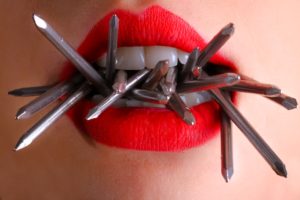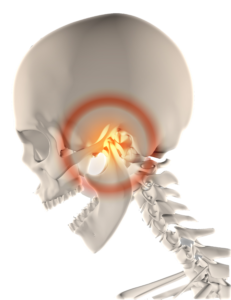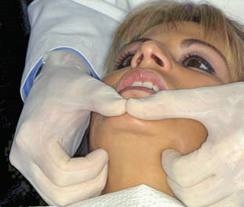Cold Sensitivity
After getting a new crown, teeth can become more sensitive to cold temperatures. The reason being that many of the all-ceramic crowns are bonded to the tooth. The conditioner used to make the cement stick to the tooth opens up the pores in the teeth so the cement will go down into the pores to bond the crown. Invariably, some of the pores don’t get filled with cement, so you can have cold sensitivity or pain because the bonding process
The simple solution is going to your dentist and getting desensitizing medications, which fill in and seal the tiny pores on teeth that are exposed to the colder temperatures. There are some really good desensitizers, like Brush & Bond, that the dentist can place around the edges or the margins of the crown that will seal up those areas.
Nerve Inflammation
Another reason teeth sensitivity can occur is nerve inflammation. There are two kinds: reversible and irreversible.
- With reversible nerve inflammation, you might also have some cold sensitivity or a little bit of pain in the tooth. Usually anti-inflammatories, like ibuprofen, will help the inflammation. Over time the sensitivity and discomfort should go away because it’s just transient inflammation in the nerve.
- With irreversible nerve inflammation, the symptoms are a little different. You may have some sensitivity to heat, as opposed to cold. It is common that you will have a toothache that may feel like a little heartbeat in the tooth. Irreversible pulpitis does not go away, so those teeth generally need to have root canals. They need to be cleaned out because there’s so much inflammation or maybe even infection in the nerve that we need to fill that space in with a sterile material. About 6% of the teeth that require crowns will end up needing a root canal.
Unbalanced Bite (Malocclusion)
 The last reason for tooth sensitivity is that a new crown or dentition you’ve had placed might not be in harmony with your chewing system. This disharmony means that the tooth is not in coherence with the other teeth, the muscles, and how the jaw closes.
The last reason for tooth sensitivity is that a new crown or dentition you’ve had placed might not be in harmony with your chewing system. This disharmony means that the tooth is not in coherence with the other teeth, the muscles, and how the jaw closes.
If you can squeeze your teeth together and elicit a pain response in the tooth, then the problem is usually bite related. Your dentist needs to check and make sure that this tooth is not hitting prematurely in your chewing position and your seated joint position.
- Your chewing position is where your teeth fit together when you chew your food. The dentist should be checking that the sensitive tooth is not the first tooth that touches.
- Your seated joint position is where our joints, lower jaw and our muscles fall into place when we fall asleep or are relaxed. So sometimes you’ll fall asleep, and that new crown will be the first tooth that you’re touching.
You don’t want the new crown to interfere with the complete closing of your jaw, which means you don’t want it to be the first thing that hits when you chew or the first thing that hits when you relax and your joints seat. What happens when you do touch first on an individual tooth is the force of your entire bite is applied only to that one tooth rather than equally applying pressure to all of your teeth. This would be like running a mile only on one toe rather than equally distributing pressure on both feet.
How do you check for an unbalanced bite?
 The dentist needs to know how to check your bite in your regular chewing position, as well as in your seated joint position. This is where Dawson-Trained Dentists have a really great advantage in properly diagnosing and treating their patients. We look for signs of instability in the chewing system before we ever recommend or provide treatment and if we see signs of instability, we make a diagnosis. After we have a diagnosis, we go over ways that we can treat and balance the bite so that the muscles, joints, and bite are all in harmony.
The dentist needs to know how to check your bite in your regular chewing position, as well as in your seated joint position. This is where Dawson-Trained Dentists have a really great advantage in properly diagnosing and treating their patients. We look for signs of instability in the chewing system before we ever recommend or provide treatment and if we see signs of instability, we make a diagnosis. After we have a diagnosis, we go over ways that we can treat and balance the bite so that the muscles, joints, and bite are all in harmony.
How do you treat an unbalanced bite?
The process of adjusting the bite is called an occlusal equilibration. Once the bite is adjusted so that it’s in harmony with the adjacent teeth, muscles, and joints, the pain should go away.
In addition to the occlusal equilibration, oftentimes you might need to address the inflammation that was caused by the unbalanced bite. For example, if the muscles have gotten really sore because the bite was not correct on that new crown, then you might need to take anti-inflammatories, like ibuprofen, or alternate hot and cold compresses to help the muscles calm down. Additionally, we would recommend eating soft food for a period of time. On occasion, if the muscles are really agitated from having that interference, we recommend taking muscles relaxers until the inflammation is relieved.
To learn more about equilibrations, click here.
Photo by Rodolfo Clix from Pexels


